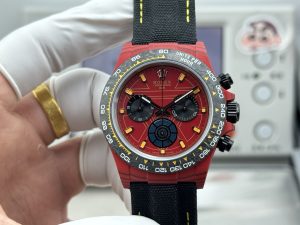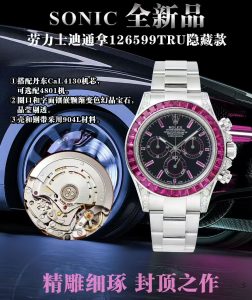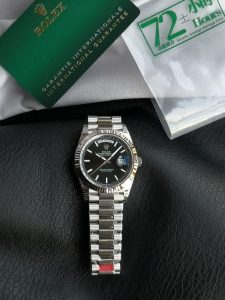The IWC Portuguese Perpetual Calendar, with its formidable 42.2mm by 14.9mm case, is not just a testament to horological craftsmanship but a conversation starter in both luxury and replica watch enthusiasts’ circles. Powered by the robust Caliber 52610 automatic movement, this timepiece encapsulates the allure of perpetual calendars—complicated watches that showcase human ingenuity in measuring time.
The legacy of the Portuguese series is deeply rooted in IWC’s history, echoing a blend of maritime tradition and avant-garde engineering. Yet, as with all luxury watches, the debate between owning an authentic piece and opting for a replica version is ever-present. The ethics of this choice are multifaceted, touching on brand integrity, consumer choice, and market accessibility.
The Power of Branding: IWC’s Position in the Luxury Market
International Watch Company (IWC) stands tall in the luxury watch market, thanks to a legacy of precise engineering and classic design. The Portuguese Perpetual Calendar embodies this ethos, combining elegance with engineering prowess. Despite the Swiss-made allure, the entry point for such high-end craftsmanship remains prohibitive to many, and herein lies the reason for the proliferation of replica watches. While genuine IWC watches serve as status symbols and indicators of personal success, replicas democratize this appeal by making the aesthetic accessible.
An Economic Reality: The Cost of Horological Excellence
The Portuguese Perpetual Calendar’s intricacies come at a significant financial burden, with prices often reaching well into the tens of thousands. This economic reality poses a challenge for many admirers, who might only dream of owning such a masterpiece. A replica watch, while not housing the genuine Caliber 52610, offers a semblance of this luxury at a fraction of the cost. This has prompted an ongoing discussion about the economic justification for the steep price tags of authentic luxury watches, and whether replicas serve a legitimate role in the market by offering affordability.
Ethical Perspectives: Authenticity Versus Accessibility
Critics of replica watches argue that they undermine the countless hours of craftsmanship and innovation poured into the original designs. However, from another angle, replicas can be seen as a form of appreciation—albeit indirectly—of the artistry and aesthetic appeal of these watches. The ethical quandary deepens when considering the potential impact on brand value and intellectual property, but it also raises questions about inclusivity in luxury consumption.
The Psychology of Ownership: Status and Identity
Owning an IWC Portuguese Perpetual Calendar, or even a replica, connects deeply with personal identity and self-expression. The drive to possess such a watch can be about more than mere timekeeping. Authentic models serve as both an investment and a personal milestone. For some, replicas offer a similar psychological satisfaction—allowing them to partake in the brand’s prestige without the financial overreach. This dual reality showcases the nuanced motivations behind watch ownership, where practicality often intersects with aspirational desires.
In conclusion, the IWC Portuguese Perpetual Calendar stands as a beacon of what luxury watchmaking represents: precision, legacy, and artisanal excellence. Its existence prompts a broader dialogue not only about the value of authenticity but also about the role replicas play in expanding the watch’s symbolic reach. As the luxury replica market continues to grow, so too will the depth of this conversation, reflecting our evolving perceptions of value, ownership, and identity in the world of luxury timepieces.




